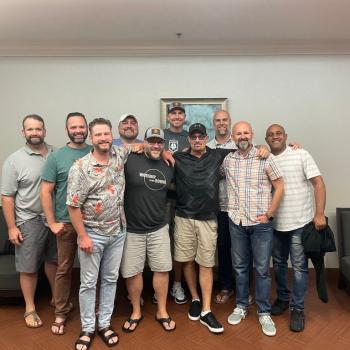
As Winter approaches, food has once again become the major concern for families everywhere. How, then, can our churches help?
For years in Britain, we had a tradition where parishioners brought fresh produce – fruit, vegetables and flowers – to church around this time of year to make a Harvest arrangement: a sort of cornucopia to represent all the food for which we were to raise our thanks to God.
Thankful we certainly were, walking into beautifully decorated churches on Harvest Sunday. Meticulously wrought exhibits of edibles abounded, while bouquets in early September colours – yellows and oranges, browns and reds – filled every spare windowsill. Over time, however, we gradually woke up to the wastefulness of it all. Today, while the pretty flowers remain, the food element is more likely to comprise non-perishable goods, which ultimately supply nearby foodbanks.
I had the privilege, recently, to meet Louise and Alli from East Belfast’s Larder foodbank, for whom the food security of Northern Ireland’s capital isn’t just a nice idea but a vocation. Situated in an Anglican chapel, deconsecrated although still under the auspices of St. Christopher’s Parish in the Church of Ireland, the Larder has operated in the city continuously since 2013.
It was a gorgeously warm afternoon in September when I dropped in. A few knocks on the heavy brown door and, as Louise greeted me with a smile, Finn the Springer Spaniel appeared! A chummy dog with a hefty bark, Finn spent most of his time padding about with a carrot in his maw. Later, when he tired of taking his carrot for walkies, Finn pockled over to Louise and scrambled up into her lap for a cuddle – yes, all 20 kilos of him!
The Larder works a little differently to most other operations of its kind. Usually, clients must receive a voucher from a recognized agency before they can visit a Northern Ireland foodbank. Indeed, this was how the Larder functioned until just earlier this year. Now, customers pay £5 – that is, roughly US$6 or €6 – for yearlong access to donated items at affordable prices.
Christians believe that all things were made through Jesus Christ. Every time a congregation rises to say the Nicene Creed, we rehearse this core tenet of our faith. We read, further, in Genesis 1, that all men and women are created in God’s image. This is our theological basis for the belief in universal human dignity.
The sacredness of a human life informs the Larder’s paid subscription model. When there is cash on the proverbial table, rather than a voucher, individuals feel a greater sense of agency. Louise and Alli know this because, before they converted over to the new scheme, they consulted all those whose foodbank experience would change, another mark of respect.
Alli told me how she’s keen that people don’t see the Larder as an austerity retailer, a term used in the UK to describe food outlets which offer prices lower than those found in the mainstream supermarkets. To this end, the team have worked hard to brand the Larder as a community centre, in which its users can feel part of a local hub.
I look around at what Louise and Alli’s Larder team have built in our city. There’s a collection of books in one corner, arrayed on white IKEA shelves. In another, there are plentiful children’s toys. Fairy lights dangle overhead in frost-white ropes. A coffee dock stands in the centre, with wooden café-style tables where members can sit and socialise. Community gardens are another project on the duo’s radar.
As our societies develop, the minimum standard of life should expand. Some basic level of social welfare is what each of us owe to fellow citizens and sojourners in our lands as a gesture of national – and indeed, human – solidarity. God’s regulation for the Hebrew people in Canaan, as is well known, was that growers of crops would leave whatever fell from the vine for the poor to glean. See Leviticus 19.
During King Solomon’s reign, the Kingdom of Israel became fabulously wealthy by the standards of the day. But if 1 Kings 10 is anything to go by – reports of a regal throne enveloped in gold and ivory (v. 18), for instance – most of these fathomless riches ended up in the royal residence rather than in the pockets of ordinary folk.
With riches pouring into the Kingdom of Israel from all over the region, was it reasonable to consign the needy to whatever they could scrounge in some farmer’s orchard? Micah the Prophet had other ideas. ‘Everyone will sit under their own vine and under their own fig tree,’ God’s oracle proclaimed, ‘and no one will make them afraid, for the Lord Almighty has spoken’ (4:4, NIV). In other words, we should strive towards a society where all can feed themselves.
But even in the year 2022, we have still to make this happen. If you’re on Instagram, TikTok or Pinterest, you’re bound to have seen the hashtag #TreatYourself. Type it in and you’ll be regaled with dozens of sumptuous images of spa breaks and swanky furniture. It’s a symptom of how self-care – attention to number one, above all others – is becoming our greatest obsession.
Can I suggest a new hashtag: #TreatSomeone? Drop a little indulgence into your local foodbank. It doesn’t have to be fancy, just an item or two that someone wouldn’t normally think to donate, something beyond the usual tinned fish and baked beans. What about elderflower cordial or chilli jam? #TreatSomeone.
It’s not only the moral thing to do; more important, it’s the Anglican thing to do! This comes from the 38th of our 39 Articles: ‘every man ought, of such things as he possesseth, liberally to give alms to the poor, according to his ability.’ Notwithstanding the language of almsgiving, which registers as patronizing to post-Enlightenment ears tuned to the creed of equality, this is a fine sentiment. Anyway, that’s my pontification over; it’s time we return to the Larder!
In the longer term, Louise explains, a shift away from conventional charity to social enterprise is where the team would like to see the Larder headed. Social enterprise is a clever way to do good in a market-friendly society. Like I say, the Larder’s objective is to provide a consumer service, to the furthest extent it’s able, not a handout.
As my time with Alli, Louise and – of course! – cheeky Finn the Springer Spaniel ended, Alli walked me back to the door. I’m so glad to have met such a pair of totally dedicated women, who aren’t afraid to challenge received wisdom and run a fantastic resource in their community.
The Larder’s pinned post on Facebook sums up everything I saw first-hand when I called: ‘We believe East Belfast can feed itself. Together, let’s work towards a more sustainable, more dignified and more effective way to support one another.’ I can’t imagine a better way to foster the Christian vision for humanity.
10/12/2022 5:14:41 PM





